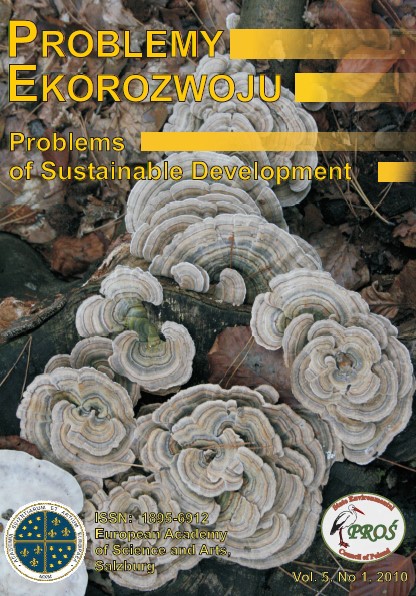Decade of Education for Sustainable Development – Polish Challenges
Article Sidebar
Issue Vol. 5 No. 1 (2010)
-
Humanitarian Motives for Sustainable Developments in a Global Economy: An Essay
Paul T. Durbin9-13
-
A Curmudgeon’s Thoughts on Sustainability
David L. Russell15-22
-
Human Progress Towards Equitable Sustainable Development: A Philosophical Exploration
Victor Udo, Artur Pawłowski23-44
-
A Multifunctional Mosaic of Green Spaces in the Context of the Lower Silesia Region (Southern Poland) Sustainable Development
Anna Zaręba45-51
-
Model of Permanent Eco-chemical Education of Employees of Chemical Industry in the Function of Ecological Development
Stanko Cvjetićanin, Mirjana Segedinac, Jasna Adamov53-58
-
Decade of Education for Sustainable Development – Polish Challenges
Tadeusz Borys59-70
-
Some of the Theoretical Sustainable Development Aspects in the Reflection of the Christian Middle Ages Philosophy
Krzysztof Bochenek71-79
-
Polish and German Experiences in Planning and Implementation of Sustainable Development
Aleksandra Kuzior81-89
-
Biodiversity Conservation as One of Necessary Conditions of Ecodevelopment
Andrzej Urbisz91-94
-
Transformation of Cultural Landscapes in the Light of the Idea of Sustainable Development
Urszula Myga-Piątek95-108
-
A Cybernetic Approach to Sacrum – Profanum Relation
Lesław Michnowski109-138
-
Problems of Evaluation of Sound and Smell Discomfort in Sustainable Development
Sebastian Bernat139-144
-
Book Review: W. Sztumski, Quo ruis homo? Środowisko życia, czas, ludzie, 2008
Ignacy S. Fiut145-148
-
Book Review: L. Gawor, Szkice o cywilizacji, 2009
Jacek Lejman145-151
-
Letter to the Editorial Office: Sustainable Economy Based on Knowledge
Bazyli Poskrobko153-154
-
Communiques on Activities of the State Environmental Council of Poland
Tomasz Winnicki157-166
Archives
-
Vol. 7 No. 2
2012-07-02 14
-
Vol. 7 No. 1
2012-01-02 12
-
Vol. 6 No. 2
2011-07-01 19
-
Vol. 6 No. 1
2011-01-03 18
-
Vol. 5 No. 2
2010-07-01 21
-
Vol. 5 No. 1
2010-01-04 16
-
Vol. 4 No. 2
2009-07-01 19
-
Vol. 4 No. 1
2009-01-05 22
-
Vol. 3 No. 2
2008-07-01 19
-
Vol. 3 No. 1
2008-01-02 12
Main Article Content
Authors
Abstract
Taking into consideration Polish challenges in shaping educational system for sustainable development, the following issues should be underlined: need to enhance narrow understanding of education, aimed at “mind” side (intellect, intellectual rationalism) and very little referring to new paradigms of development for shifting to education for sustainable development, so wide approach to the role, scope, and educational tasks joined for coherent entirety of education for sustainable development, social education and economic education. Thinking in categories of need to improve quality of live, especially in the context of balancedness of its three holistic dimensions (physical/material, psychical and spiritual/affective) is giving us good arguments for the idea of sustainable development itself and means the need of integrated education, which should include different dimensions of quality of life in the aspect of its close connections with widely understood culture. The pillar integrating these areas of education should be clearly formulated axiological attitude, based on giving and shaping “warm” values (i.e. good, empathy, effectiveness). The basic transmitter of value systems to different spheres of holistic education is certainly culture, which should – in this role – infiltrate all dimensions and kinds of education. The essence of such education is directly expressed in European Strategy of Education for Sustainable Development, and is also the basic direction which is presented in the UN’s Decade of Education for Sustainable Development 2005-2014.
Keywords:
References
BANSE G., KIEPAS A. (red.), Zrównoważony rozwój: od naukowego badania do politycznej strategii, wyd. Sigma, Berlin 2005
BORYS T., Wąskie i szerokie interpretacje zrównoważonego rozwoju oraz konsekwencje wyboru, w: Zrównoważony rozwój – od utopii do praw człowieka, red. Papuziński A., wyd. Branta, Bydgoszcz 2005.
BORYS T., Problemy edukacji dla zrównoważonego rozwoju – perspektywa aksjologiczna w: Kultura a zrównoważony rozwój: środowisko-ład przestrzenny - dziedzictwo, red. Janikowski R. i Krzysztofek K., UNESCO Warszawa 2009.
BORYS T., Bildung fur eine nachhalitige Entwicklung –polische Erfahrungen, w: Nachhalitge Entwicklung in Polen und Deuschland: Landwirtschaft – Tourismus – Bildung, Edition Sigma, Berlin 2007, s. 269-283.
BORYS T. (red.), Edukacja dla zrównoważonego rozwoju, Wyd. „Ekonomia i Środowisko” Białystok 2006.
BORYS T., JAMKA R. (red.), Edukacja dla ekorozwoju, wyd. Fundacja „Partnerstwo dla Środowiska” Program „Jakość – Oferta – Współpraca”, Kraków – Jelenia Góra 1999.
BORYS T. (red.) Rola wyższych uczelni w edukacji dla ekorozwoju, wyd. Ekonomia i Środowisko, Białystok 2003.
BORYS T. (red.), Wskaźniki zrównoważonego rozwoju, wyd. Ekonomia i Środowisko, Warszawa- Białystok, 2005.
CZERWIŃSKI M., Pytając o cywilizację, Wyd. Cis, Warszawa 2000.
EDUKACJA, http://pl.wikipedia.org/
KAFEL K., W gąszczu definicji zrównoważonego rozwoju, w: Wybrane zagadnienia z ekologii i ochrony środowiska. Teoria i praktyka zrównoważonego rozwoju, red. Kalinowska A., Lenart W., Uniwersytet Warszawski, Warszawa 2007.
Narodowy Program Edukacji Ekologicznej (NPEE Program wykonawczy Narodowej Strategii Edukacji Ekologicznej oraz warunki jego wdrożenia), Ministerstwo Środowiska, Warszawa 2001.
Oświadczenie w sprawie Edukacji dla Zrównoważonego Rozwoju; V Konferencja Ministerialna „Środowisko dla Europy” („Environment for Europe”), Kijów 2003.
PEZZEY J., Economic Analysis of Sustainable Growth and Sustainable Development, Environment Department Working Paper – The World Bank, no 15, 1989.
Przez edukację do zrównoważonego rozwoju. Narodowa Strategia Edukacji Ekologicznej – NSEE, Ministerstwo Środowiska, Warszawa 2001.
REDCLIFT M. R, Sustainable Development (1987-2005) – an Oxymoron Comes of Age (Rozwój (1987-2005) zrównoważony - oksymoron czasu dorastania, w: Problemy Ekorozwoju/Problems of Sustainable Development, vol. 4, no 1, 2009, s. 33-34.
Strategia Edukacji dla Zrównoważonego Rozwoju, Europejska Komisja Gospodarcza ONZ Warszawa 2008 (przyjęta na spotkaniu wysokiego szczebla przedstawicieli Ministerstw ds. Środowiska oraz Edukacji; Wilno, 17-18 marca 2005 r.).
SZTUMSKI W., Refleksja na temat rozwoju zrównoważonego rozwoju – czy zrównoważony rozwój jest fikcją, utopią, iluzją czy oszustwem?, w: Problemy Ekorozwoju/Problems of Sustainable Development vol. 3, no 2, 2008, s. 133-139.
UNESCO, http://www.unesco.pl/edukacja/dekada-edukacji-nt-zrownowazonego-rozwoju/neste/1/
WCED, Our Common Future, Oxford University Press, New York 1987.
Zrównoważona Europa dla lepszego świata: Strategia Zrównoważonego Rozwoju Unii Europejskiej, Komunikat Komisji Europejskiej, Bruksela 15 maja 2001.
ZACHER L.W., Trwały rozwój – utopia czy realna możliwość?, w: Problemy Ekorozwoju/Problems of Su-stainable Development, vol. 3, no 2, 2008, s. 63-68.
Article Details
Abstract views: 41
License

This work is licensed under a Creative Commons Attribution-ShareAlike 4.0 International License.


